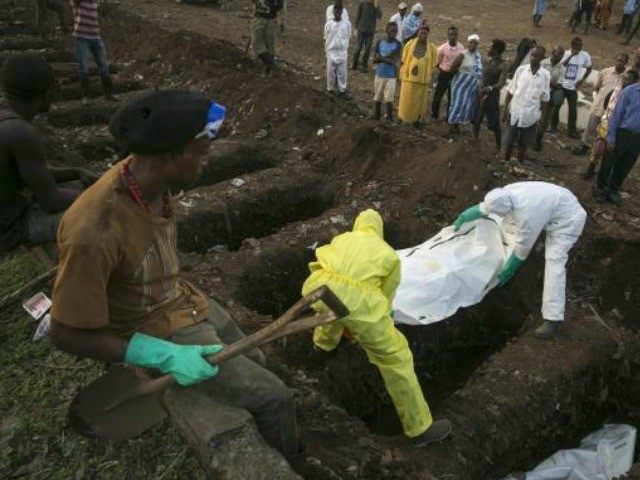Since it was first identified as a threat in March of this year, the Ebola outbreak in West Africa has taken at least 7,500, according to the latest tally by the World Health Organization.
The Wall Street Journal reports that the World Health Organization issued this update Monday following the announcement of another shocking number: 19,340 cases of Ebola worldwide since the current outbreak. While most cases have been diagnosed in Liberia, Sierra Leone, and New Guinea, cases in Nigeria, Spain, and the United States have also been recorded.
While the outbreak reached a critical point of news coverage in the United States between August and October, the virus continues to ravage parts of west Africa. This week, United Nations Secretary General Ban Ki-Moon announced a visit to Liberia, one of the hardest-hit nations by the outbreak, though it has also been one of the more successful nations in curbing the spread of the disease in recent months. Ban commended the nation in an address in Liberia this week, noting that efforts have been somewhat successful. “Where the strategy of isolation of the patients and treatment, contact tracing and safe and dignified burial is implemented, it is working,” he noted, “Some areas that were once hot spots, such as Lofa County in Liberia, have been free of Ebola for weeks.”
The WHO announced this week that Liberia’s individual death toll currently stands at 3,376. Also on hand in Liberia is Dr. Thomas Frieden, the head of the US Centers for Disease Control. The Liberian Observer notes that Frieden was stern in warning that, while Liberia appears to be slowly recovering from the outbreak, any lack of care in isolating patients or properly protecting health personnel could trigger a second wave of infections.
While Liberia is receiving much of the attention, Sierra Leone’s advances in fighting Ebola appear slim, at best. Just this week, the nation yet again lost one of its top doctors to Ebola: Dr. Victor Willoughby, a senior Ebola doctor who died just hours before an experimental medicine sent for him from Canada arrived in the nation. He was the eleventh doctor to succumb to the disease in Sierra Leone. Reuters notes that the entire nation had only 132 doctors before the Ebola outbreak began.
Doctors speaking to Reuters note that Sierra Leone appears to have fallen into a particularly dire situation because the government has had trouble paying health workers full wages, creating a situation where many who could help have gone on strike or simply refuse to. In one city in November, outraged burial workers protested the lack of wages by lining the streets with corpses of Ebola victims.

COMMENTS
Please let us know if you're having issues with commenting.